#etfs vs index funds vs mutual funds
Text
Mutual Funds vs Stocks: Why Mutual Funds Win!
Mutual funds offer several benefits such as professional management, diversification, convenient and easy investment, and lower costs, which make them a more attractive option than stocks.
#mutual funds#stocks vs mutual funds#index funds vs mutual funds#etf vs mutual funds#index funds vs mutual funds vs etf#mutual funds vs stocks#index funds vs etf#mutual funds vs etf#stocks vs mutual funds india#mutual funds for beginners#stock market vs mutual funds in telugu#index funds vs stocks#shares vs mutual funds#mutual funds vs index funds#etf vs mutual funds vs index funds#mutual fund vs index fund#mutual fund#stock vs mutual fund where to invest
1 note
·
View note
Text
ETF Investing: Differences Between ETF vs Mutual Funds
What Is an ETF?
An ETF (Exchange-Traded Fund) is similar to a mutual fund, pooling investments to track a particular index, industry, or even a range of assets. It offers a wide range of options, from tracking the price of a single commodity to covering a diverse array of assets. Moreover, it is set apart by its ability to be traded on stock exchanges like individual stocks.
ETF prices fluctuate throughout the day because they are bought and sold on stock exchanges in real-time. This real-time trading not only enhances their liquidity but also typically makes them more cost-effective than mutual funds.
Differences Between ETF vs MF (Mutual Fund)

5 Types of ETFs
Equity ETF
Equity ETF tracks stock market indices like the S&P 500. They provide broad exposure to a diversified portfolio of stocks, making them ideal for long-term investors looking to benefit from overall market growth.
Bond ETF
Bond ETF invests in a portfolio of bonds, including government, corporate, and municipal bonds. These ETFs are suitable for income-focused investors, offering regular interest payments and reduced volatility compared to equities.
Commodity ETF
Commodity ETF tracks the price of physical commodities such as gold, silver, or oil. They are useful for hedging against inflation and diversifying beyond stocks and bonds, though they tend to be more volatile.
International ETF
International ETF provide exposure to markets outside your home country. They help diversify your portfolio globally, reducing reliance on a single economy and tapping into growth opportunities in other regions.
Sector and Industry ETF
Sector and Industry ETFs focus on specific areas of the economy, like technology or healthcare. These ETFs are ideal for targeting sectors expected to outperform the broader market but come with higher risk due to less diversification.
Read more: FinxpdX
0 notes
Text
youtube
Join Radhika Gupta, the dynamic MD & CEO Of Edelweiss mutual fund, as she explains all about Long Term Investing in ETF vs Index Funds - investing strategies, Pros and Cons.
0 notes
Text
Best Stock Market Course In Jalandhar
1. Introduction to the Stock Market
What is the Stock Market?: Basic concepts and functions.
Types of Markets: Primary vs. Secondary markets.
Major Stock Exchanges: NYSE, NASDAQ, etc.
2. Stock Market Participants
Individual Investors: Retail vs. Institutional.
Brokers and Brokerage Accounts: How to choose and open an account.
Regulatory Bodies: SEC, FINRA, etc.
3. Investment Basics
Stocks and Shares: Common vs. Preferred.
Bonds and Other Securities: Basics of fixed income.
Mutual Funds and ETFs: Diversification and index funds.
4. Fundamental Analysis
Financial Statements: Income statement, balance sheet, cash flow statement.
Valuation Metrics: P/E ratio, EPS, ROE, etc.
Economic Indicators: GDP, inflation, unemployment rates.
5. Technical Analysis
Charts and Graphs: Understanding price trends and patterns.
Technical Indicators: Moving averages, RSI, MACD.
Trading Strategies: Day trading, swing trading, long-term investing.
For More Info : Stock Market Course in Jalandhar | Best Share Market Course (gtbinstitute.com)
0 notes
Link
#etfvsmutualfunds#etfvsmutualfundsvsindexfunds#etfsvsindexfunds#etfsvsmutualfunds#indexfunds#indexfundsforbeginners#indexfundsvsetf#indexfundsvsmutualfunds#indexfundsvsmutualfundsvsetf#indexmutualfunds#mutualfund#mutualfundinvesting#mutualfundvsindexfund#mutualfunds#mutualfundsforbeginners#mutualfundsvsetf#mutualfundsvsetfs#mutualfundsvsindexfunds#vanguardindexfunds
0 notes
Text
KNOWING WHEN TO INVEST IN THE MARKET AND HOW TO NAVIGATE THE WAVES

Investing in the stock market may be likened to negotiating choppy waves of uncertainty and volatility. However, there can be substantial benefits for individuals who become adept at timing. Knowing when to buy in the market is essential to reaching financial independence, making the most out of your investments, and successfully conserving cash. We'll examine methods for wise investing, examine the intricacies of market timing, and offer guidance on how to proceed with your financial journey in this piece.
Comprehending Market Timing
Predicting future market movements to buy low and sell high is known as market timing. Even though it seems simple, this is a notoriously hard task to carry out. Market performance is influenced by a number of variables, such as economic data, business earnings, geopolitical developments, and investor sentiment. For most investors, therefore, perfect timing is more of an ideal than a workable plan.
The Delusion of Ideal Timing
Many investors wait for the optimal period, usually when equities are at their lowest, in an attempt to find the elusive "perfect time" to enter the market. However even experienced investors and financial specialists find it difficult to accurately forecast market changes. This quest may result in lost chances and postponed financial development.
Despite sporadic swings, historical data shows that the market tends to grow over time. Therefore, concentrating on reliable, long-term investing tactics is a more effective strategy than aiming for perfection.
Dollar-Cost Average: A Trustworthy Method
Dollar-cost averaging is a well-liked method for reducing the risks associated with market timing (DCA). DCA entails investing a certain sum of money regularly, independent of market circumstances. By ensuring that you purchase more shares during periods of low price and fewer during periods of high price, this strategy helps you average out the cost of investments over time.
If you decide to spend $200 a month, for instance, you might buy more shares at a market downturn and less at a peak. With time, this tactic might lessen the effects of volatility and offer a more straightforward route to financial expansion.
Investing Time vs. Timing in the Market
"Time in the market" is a more important concept to grasp than "timing the market." According to historical data, your chances of achieving good returns increase with the length of time you invest. Numerous studies have demonstrated that, despite brief downturns, markets typically trend upward over extended periods of time, lending weight to this idea.
Compounding returns, in which profits yield additional profits, are advantageous to investors who stay in the market for extended periods of time. Your portfolio may increase dramatically as a result of this compounding impact, highlighting the significance of having a long-term outlook.
Diversification and Investment Options
Achieving financial freedom and optimizing returns requires selecting the appropriate investment options. Investing broadly across a range of asset types, or diversification, can reduce risk and increase return potential. Here are some important investment choices to think about:
Stocks: Although they have a greater potential for profit, stocks also have more volatility. Purchasing a diverse portfolio of equities can help you profit from market growth while lowering risk.
Bonds: Bonds offer consistent interest payments and are typically less volatile than equities. Bonds help offset the risk in your portfolio that comes with stocks.
Both mutual funds and exchange-traded funds (ETFs) provide diversification within a single investment. ETFs generally follow an index, whereas mutual funds are actively managed.
Real estate: Investing in real estate can yield both capital growth and rental income. You can make real estate investments even if you don't actually own any real estate by using Real Estate Investment Trusts (REITs).
Savings accounts and certificates of deposit (CDs): These low-risk, liquidity- and capital-preserving solutions provide lower yields.
Financial Measures and Market Trends
Making informed investing decisions can be aided by knowledge of market cycles and economic data. Important signs to keep an eye on are:
GDP expansion: Increased business profits and stock prices are frequently the result of robust economic expansion.
Inflation Rates: While excessive inflation can reduce purchasing power and have an adverse effect on investment returns, moderate inflation can be a sign of a developing economy.
Interest rates: While rising rates may cause market corrections, low rates can promote economic growth and increase stock prices.
Employment Statistics: A strong economy and rising consumer purchasing power are typically indicated by high employment rates.
Market cycles, which consist of expansion, peak, contraction, and trough phases, are inherent features of the state of the economy. Understanding these cycles might assist you in keeping a balanced viewpoint and making well-informed decisions amid market swings.
Emotional Investing and Behavioral Factors
Investing emotionally might be a typical mistake. Irrational decisions, like panic selling during downturns or hasty buying during peaks, might be motivated by fear or greed. Emotional biases can be mitigated by creating and adhering to a disciplined investment strategy.
Creating and Maintaining Financial Objectives
Setting definite financial objectives is essential to your investing path. Having defined goals can help direct your investment approach, whether your goal is to save for a down payment on a house, accumulate retirement funds, or become financially independent.
It's critical to persevere through market turbulence. Avoid the temptation to make snap decisions based on transient fluctuations in the market. Long-term success can be ensured by routinely analyzing and modifying your portfolio to match your objectives and risk tolerance.
Also read: Unlocking Financial Potential: Top 10 Government Investment Schemes
summary
It takes a combination of knowledge of economic data, adherence to dependable investment strategies, and long-term thinking to determine when it is optimal to make market investments. Although it might be difficult to time the market, strategies like diversification and dollar-cost averaging can reduce risk and increase profits.
Smart investing can lead to financial freedom, but it also takes patience, discipline, and an eye on the long term. By employing well-informed tactics to navigate the waves of market changes, you can maximize your investments and establish a stable financial future. Recall that the secret is to use consistent, strategic investing to turn time into your advantage rather than waiting for the ideal moment to invest.
0 notes
Text
Index Fund vs Real Estate

When determining how to invest your money, index funds and real estate are two popular choices. Both provide opportunities to increase your wealth over time. Is one better than the other? We will use a real-world example to compare index funds and real estate investing.
Index funds and real estate are asset types with distinct advantages and dangers. This essay will look at both the advantages and disadvantages of each. With careful preparation, index funds and real estate can complement each other in an investing portfolio. The right allocation between these two pillars of investment will be determined by taking into account your unique financial goals and risk tolerance. By the conclusion, you'll have a better understanding of which investment strategy would be best for your needs. Let's delve in and compare index funds against real estate objectively.
Setting the Investment Stage
Index funds and real estate are two common investing portfolio possibilities. Both have potential advantages, but they also differ significantly. Let's compare and contrast index funds and real estate investing to see which is a better fit for your financial objectives. The first and most significant aspect is your area of expertise and what draws you in. You'll perform best with the one you're most passionate about. People who enjoy the stock market but do not want to deal with property management may be better off investing in index funds. Those passionate and excited about real estate and the possibilities for leveraging debt and expanding in price over time in economic booms may be drawn to owning properties.
What is an Index Fund?
Definition & Basics
An index fund is a mutual fund or exchange-traded fund (ETF) that tracks a market index, such as the S&P 500. Index funds provide broad market exposure with passive management, which means the fund manager makes minimal stock-picking decisions. Index funds often feature modest costs and seek to equal, not outperform the market.
Pros and Cons of Investing in Index Funds:
The benefits of index funds include cheap expenses, market diversification, and passive management, which results in more predictable returns. Cons include a lack of control over specific assets and the inability to outperform the market.
What Is Real Estate Investment?
Types of Real Estate Investment
Real estate investing involves a variety of tactics, including house flipping, rental properties, REITs, and real estate crowdfunding. Investors can pick between residential and business properties.
Benefits and Drawbacks of Real Estate
The benefits of real estate include cash flow from rentals, long-term appreciation, leverage through mortgages, and a tangible asset. Cons include illiquidity, active management, property taxes and upkeep costs, and a lack of diversification.
Historical Returns: Index Funds against Real Estate
In the long run, index funds and real estate returns are comparable, averaging 8-12% per year. However, real estate tends to be more cyclical, with larger boom and bust cycles. Index funds provide more steady and less volatile returns year after year.
Liquidity and Accessibility: How Easy Is It to Access Your Money?
Index funds provide daily liquidity, allowing you to sell your shares promptly on any business day. Real estate is extremely illiquid, taking weeks or months to sell a home. This restricts access to your capital.
Diversification: Spreading Risk over the Market Index funds offer quick diversification over hundreds or thousands of stocks. Unless you own many properties in different markets, your real estate investments are significantly more concentrated in a single asset class and geographic area.
Tax Implications: How Both Investments Influence Your Tax Bill
Index funds earn taxable capital gains dividends, though most are postponed until you sell. Real estate can provide deductions, such as depreciation, to offset rental income. A 1031 exchange allows you to possibly delay taxes on gains.
Barriers to entry include initial costs and the learning curve.
Index funds do not require a minimum investment to begin. Real estate typically requires a 20% down payment, plus closing costs and charges. Real estate has a steeper learning curve regarding finance, management, and laws.
Management and Maintenance: Time And Effort Investment
Real estate requires active management, such as securing tenants, maintenance, and repairs, whereas index funds are passive investments. However, you can delegate many real estate chores to a property manager.
Long-Term Growth and Income Prospects
Index funds provide easy growth in the stock market. Real estate can also appreciate while providing rental revenue. Finally, both promote long-term wealth accumulation. The key is your investing time frame and goals.
Key Takeaways
Index funds offer passive, diversified exposure to stock markets at low cost and liquidity. Real estate requires diligent management, but it provides leverage, tax benefits, and income possibilities.
Over time, real estate and index funds produce comparable returns, averaging 8-12% each year. However, real estate is more volatile, with boom and bust cycles.
Index funds are significantly more accessible than real estate. Index funds have modest minimum investments, whereas real estate requires down payments and financing.
Real estate provides more active control and flexibility for managing your investments. Index funds are completely hands-off.
Leverage can improve gains in real estate, but it also increases danger. Index funds don't offer leveraged alternatives.
Market timing and cycles affect both investments. Index funds experience shorter downturns, but real estate is more cyclical.
0 notes
Text
Unlocking the Mystery: A Comprehensive Guide to ETFs
Introduction
In recent years, ETFs have emerged as a popular investment vehicle, offering investors a diverse range of options to diversify their portfolios. But what exactly are ETFs and how do they work? In this comprehensive guide, we unravel the mystery behind ETFs and explore their role in the investment landscape.
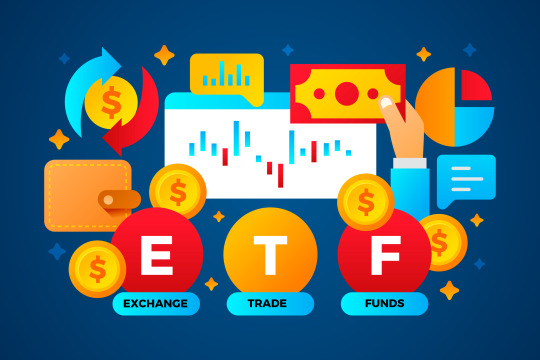
What Are ETFs?
ETFs, or Exchange-Traded Funds, are investment funds that are traded on stock exchanges, much like individual stocks. They are designed to track the performance of a specific index, commodity, bond, or a basket of assets.
Understanding ETF Structure
ETFs are structured as open-ended investment companies or unit investment trusts. They issue shares to investors, which represent ownership in the underlying assets held by the fund. These shares can be bought and sold throughout the trading day on stock exchanges, providing investors with liquidity and flexibility.
Click Here To Know About Top 16 DeFi Open Source Projects!
How Do ETFs Work?
ETFs work by pooling together funds from multiple investors to invest in a diversified portfolio of assets. This allows investors to gain exposure to a particular market or sector without the need to buy individual stocks or assets.
Tracking an Index
One of the most common types of ETFs is index funds, which aim to replicate the performance of a specific index, such as the S&P 500 or the Nasdaq. These ETFs invest in the same securities that make up the index in proportion to their weight, providing investors with broad market exposure.
Active vs. Passive Management
ETFs can be either passively managed or actively managed. Passively managed ETFs aim to replicate the performance of a specific index, while actively managed ETFs seek to outperform the market through active stock selection and portfolio management.
Types of ETFs
There are several types of ETFs available to investors, each with its own unique characteristics and investment objectives.
Equity ETFs
Equity ETFs invest in stocks and aim to replicate the performance of a specific equity index or sector. They provide investors with exposure to a diversified portfolio of stocks, allowing them to participate in the growth potential of the equity market.
Fixed-Income ETFs
Fixed-income ETFs invest in bonds and other fixed-income securities. They provide investors with exposure to a diversified portfolio of bonds, offering potential income and capital appreciation.
Commodity ETFs
Commodity ETFs invest in physical commodities, such as gold, silver, oil, or agricultural products. They allow investors to gain exposure to the price movements of commodities without the need for physical ownership.
Sector ETFs
Sector ETFs focus on specific sectors or industries, such as technology, healthcare, or energy. They provide investors with targeted exposure to sectors that they believe will outperform the broader market.
International ETFs
International ETFs invest in stocks or bonds of companies or countries outside of the investor's home country. They provide investors with exposure to global markets and diversification benefits.
Benefits of ETFs
ETFs offer several benefits to investors, including:
Diversification
ETFs provide investors with access to a diversified portfolio of assets, reducing the risk of concentration in any single investment.
Liquidity
ETFs are traded on stock exchanges, providing investors with liquidity and flexibility to buy and sell shares throughout the trading day.
Cost-Efficiency
ETFs typically have lower fees compared to mutual funds, making them a cost-effective investment option for investors.
Transparency
ETFs disclose their holdings on a daily basis, providing investors with transparency into the fund's portfolio and performance.
Conclusion
In conclusion, ETFs are a versatile investment vehicle that offers investors a range of benefits, including diversification, liquidity, and cost-efficiency. By understanding how ETFs work and the different types available, investors can make informed decisions to build a well-balanced investment portfolio.
0 notes
Photo
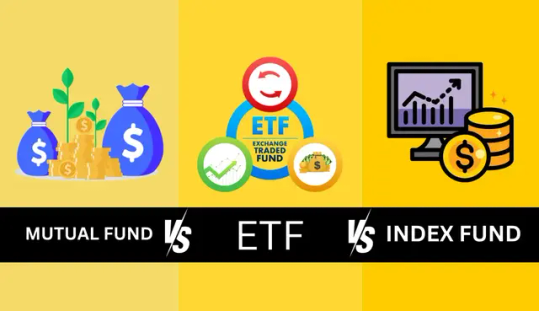
ETF vs Mutual Funds vs Index Funds: A Comprehensive Comparison
0 notes
Text
Active vs. Passive Funds: A Comprehensive Guide for Investors

Investing in mutual funds offers individuals a convenient way to diversify their portfolios and participate in the financial markets. When exploring mutual funds, investors often encounter the choice between active and passive funds. Understanding the key differences, strategies, costs, and potential benefits of each type is essential for making informed investment decisions.
Active Funds:
Active funds are managed by professional portfolio managers or teams who actively make investment decisions. The aim is to outperform a specified benchmark index or the broader market. These managers use their expertise, research, and market analysis to select individual securities they believe will generate superior returns. Active managers regularly adjust the fund's holdings, buying and selling securities with the goal of maximizing returns.
Pros of Active Funds:
Potential for Outperformance: Skilled fund managers seek to beat the market and deliver returns that exceed the benchmark.
Flexibility: Active management allows for quick adjustments to the portfolio in response to market conditions or emerging opportunities.
Cons of Active Funds:
Higher Costs: Actively managed funds typically have higher fees due to the costs associated with research, trading, and management.
Performance Variability: The success of active funds depends on the manager's skills and decisions, leading to varying performance compared to benchmarks and inconsistency in returns.
Passive Funds:
Passive funds, also known as index funds or exchange-traded funds (ETFs), aim to replicate the performance of a specific market index, such as the S&P 500 or the NASDAQ. Rather than attempting to beat the market, passive funds aim to mirror the returns of the index they track by holding a portfolio of securities that mirrors the index's composition.
Pros of Passive Funds:
Lower Costs: Passive funds typically have lower expense ratios as they require minimal management, resulting in lower fees for investors.
Consistent Performance: Since they aim to match an index, passive funds offer consistent returns closely aligned with the market's performance.
Cons of Passive Funds:
Limited Potential for Outperformance: Passive funds do not attempt to outperform the market, potentially missing opportunities for higher returns during favorable market conditions.
Inflexibility: These funds replicate the index's composition, which may include overvalued or underperforming stocks, limiting the fund's flexibility.
Considerations for Investors:
When choosing between active and passive funds, investors should consider their investment objectives, risk tolerance, time horizon, and preferences.
Risk Tolerance and Goals: Investors seeking potentially higher returns may opt for active funds despite higher costs and performance variability. Conversely, those prioritizing lower costs, consistent returns, and simplicity might prefer passive funds.
Time Horizon: For long-term investors, passive funds might offer steady returns while minimizing costs over time, whereas short-term investors might seek potential outperformance from active management.
Conclusion:
The decision between active and passive funds is subjective and depends on an investor's preferences, goals, and risk tolerance. Active funds seek to outperform the market through strategic management, while passive funds aim to replicate market returns with lower costs.
Understanding the trade-offs between these two approaches enables investors to make informed decisions aligned with their financial goals. Ultimately, seeking guidance from financial advisors and conducting thorough research can assist investors in constructing a diversified portfolio that aligns with their investment philosophy and long-term aspirations.
0 notes
Text
100 popular topic related to investment in indian market

100 popular topic related to investment in indian market
we will discuses blow 100 topics in our next blogs
certainly! Here's a list of 100 popular investment topics related to the Indian market:
- Introduction to Indian Stock Market
- Basics of Equity Investing in India
- Navigating the National Stock Exchange (NSE) and Bombay Stock Exchange (BSE)
- Investing in Indian Mutual Funds
- Understanding Index Funds and ETFs in India
- Indian Real Estate Investment: Trends and Opportunities
- Investing in Indian Government Bonds
- Fixed Deposit and Other Bank Investments in India
- Indian Commodity Market: Overview and Trading Strategies
- Demat Account and its Significance in India
- Indian Derivatives Market: Futures and Options
- Foreign Direct Investment (FDI) in India
- Indian Startup Investments and Venture Capital
- Initial Public Offerings (IPOs) in the Indian Market
- Indian Taxation and its Impact on Investments
- Indian Economic Indicators and their Role in Investment Decisions
- Investing in Indian Small-Cap Stocks
- Large-Cap vs. Mid-Cap Stocks: Pros and Cons
- Indian Real Estate Regulation and Development Act (RERA)
- Sovereign Gold Bonds in India
- Indian Corporate Bond Market: Opportunities and Risks
- Systematic Investment Plan (SIP) in Indian Mutual Funds
- Growth vs. Value Investing in Indian Stocks
- Investing in Indian Government Securities
- Indian Currency Market: Forex Trading
- Real Estate Investment Trusts (REITs) in India
- Indian Banking Sector and Investment Opportunities
- Mutual Fund SIP vs. Lumpsum Investment in India
- Investing in Indian Infrastructure Projects
- Tax-Saving Investments in India (e.g., ELSS)
- Indian Real Estate Market vs. Stock Market
- Best Performing Mutual Funds in India
- Indian Commodity Exchanges: MCX and NCDEX
- National Pension System (NPS) and its Benefits in India
- Equity Research and Fundamental Analysis in India
- Indian IPO Review and Analysis
- Investment Opportunities in Indian Pharmaceutical Sector
- Private Equity Investments in Indian Companies
- Indian Mutual Fund Ranking and Selection Process
- Investing in Indian Renewable Energy Projects
- Top Indian Stocks to Watch in 20XX
- Indian Real Estate Bubble: Myth or Reality?
- Indian Auto Sector Investment Outlook
- P2P Lending and Crowdfunding in India
- Impact Investing in Indian Social Enterprises
- Investment Strategies during Economic Downturns in India
- Indian Information Technology (IT) Sector Stocks and Growth
- Indian Retail Sector Investments and Future Prospects
- Investing in Indian Education Sector
- Indian Textile Industry: Opportunities and Challenges
- Indian Housing Market: Trends and Forecast
- Investment Risks and Mitigation Strategies in India
- Indian Telecom Sector: Investments and Growth Potential
- Investing in Indian Gold Market
- Indian Steel Industry: Investment Analysis
- Indian Agriculture Sector Investments
- Investing in Indian Healthcare and Pharma Stocks
- Indian Media and Entertainment Industry: Investment Opportunities
- Real Estate Investment Strategies in Indian Tier 2 Cities
- Indian Consumer Goods Sector Investments
- Investing in Indian Oil and Gas Industry
- Indian Cement Industry: Market Analysis and Investments
- Regulatory Environment for Foreign Investors in India
- Investing in Indian Hotel and Hospitality Industry
- Indian Fintech Startups and Investment Landscape
- Indian Power Sector Investments and Renewable Energy
- Investing in Indian Biotechnology Companies
- Indian Banking Sector: NPA and Investment Risks
- Top Indian Multinational Companies for Investment
- Indian Electric Vehicle (EV) Industry: Opportunities and Challenges
- Investing in Indian Small and Medium Enterprises (SMEs)
- Indian Aviation Sector: Investment Outlook
- Indian Realty Investments: Metro Cities vs. Non-Metro Cities
- Investing in Indian Defense and Aerospace Industry
- Indian E-commerce Market: Investment Trends
- Indian Railway Sector Investments and Privatization
- Investing in Indian Software Services Companies
- Indian Education Technology (EdTech) Startups: Investment Prospects
- Indian Warehousing and Logistics Sector: Investment Analysis
- Investing in Indian AgriTech Startups
- Indian Government's Atmanirbhar Bharat Initiative and Investment Implications
- Investing in Indian Artificial Intelligence (AI) Companies
- Indian Gems and Jewelry Industry: Market Analysis
- Indian Pharmaceuticals: Generic vs. Branded Drugs Investment
- Investing in Indian Renewable Energy ETFs
- Indian Fast-Moving Consumer Goods (FMCG) Sector: Investment Opportunities
- Indian Real Estate Market and COVID-19 Impact
- Investing in Indian Food Processing Industry
- Indian 5G Technology Investments and Future Prospects
- Indian Chemical Industry: Investment Trends
- Investing in Indian Waste Management and Recycling Companies
- Indian E-gaming and Online Entertainment: Investment Landscape
- Indian HealthTech Startups: Investment Potential
- Investing in Indian Artificial Intelligence of Things (AIoT) Startups
- Indian Digital Payment Industry: Investment Outlook
- Indian Education Sector: Online Learning and Investment
- Investing in Indian Green Bonds
- Indian Robotics and Automation Industry: Investment Analysis
- Indian Cryptocurrency Market: Investment Opportunities
- Investing in Indian Hydroelectric Power Projects
Please note that the investment landscape can be dynamic, and it's essential to conduct thorough research and seek advice from financial experts before making any investment decisions.
Read the full article
0 notes
Text
Exchange Traded Funds vs. Mutual Funds: Understanding the Differences and Similarities
Investing in the stock market can be a profitable method to enhance your wealth, but there are so many possibilities that it can be daunting. Exchange-traded funds (ETFs) and mutual funds are two common investment vehicles that people consider. Both ETFs and mutual funds provide possibilities to diversify your portfolio and invest in a variety of assets, but they have key distinctions and similarities.
Let's start with an explanation of what is mutual fund. A mutual fund is a sort of investment instrument that pools money from several investors and uses it to invest in a diverse portfolio of stocks, bonds, or other securities. A professional fund manager manages it and makes investment decisions on behalf of the investors. Investors purchase mutual fund shares, and the value of their investment is defined by the fund's net asset value (NAV), which is computed daily based on the underlying securities' value.
One significant distinction between Exchange Traded funds and mutual funds is how they are exchanged. Exchange Traded Funds, as the name implies, are exchanged on stock exchanges in the same way that individual equities are. This means that you can buy and sell Exchange Traded Fund shares at market prices throughout the trading day. Mutual funds, on the other hand, are normally purchased and sold through the fund company at the end of the trading day at the NAV price.
Another distinction is found in their investment techniques. Mutual funds are actively managed, which implies that the fund manager selects and manages the fund's investments in order to outperform the market. This includes researching, analysing securities, and making financial decisions based on their knowledge. Exchange Traded Funds, on the other hand, can be managed actively or passively. Passively managed Exchange Traded Funds seek to replicate the performance of a given index, such as the S&P 500, by holding a portfolio of securities with the same composition as the index.
Fees and expenditures are also key considerations. Mutual funds frequently levy management fees, also known as expense ratios, to cover the costs of fund management. These costs might vary greatly depending on the fund and can significantly reduce your profits over time. Exchange Traded Funds often have lower expense ratios than actively managed mutual funds because passive management includes lower costs.
Exchange Traded Funds and mutual funds both provide diversification to investors. You obtain exposure to a diverse portfolio of securities by investing in a single Exchange Traded Fund or mutual fund, which can help reduce risk. However, when it comes to diversification, Exchange Traded Funds may provide more options. Exchange Traded Funds cover a wide range of asset classes, industries, and geographic locations, allowing investors to tailor their portfolios to their unique investing goals.
Exchange Traded Funds have a potential advantage in terms of tax efficiency. Exchange Traded Funds are often more tax-efficient than mutual funds due to their unique structure. Exchange Traded Funds can reduce capital gains distributions by utilising in-kind transfers and a creation/redemption process that does not need the sale of securities.
0 notes
Text
ETF Vs. Mutual Funds Vs. Index Funds- Which one is better?
What are Exchange-Traded Funds (ETFs)?
ETFs are funds that are types of funds similar to individual stocks that are traded on stock exchanges. They include a portfolio of stocks, bonds, and commodities. ETFs are quite popular among investors for their high liquidity, low costs, and flexibility.
Besides being tax-efficient, ETFs are tradeable daily at current market prices. They are great…
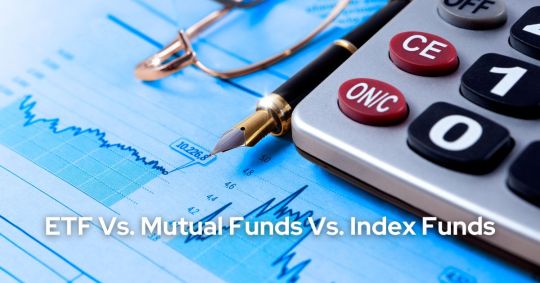
View On WordPress
0 notes
Text
0 notes
Text
6 Unbelievable Facts About Mutual Funds V ETFs(2023 updated)
Confused in the challenge of choosing between mutual funds v ETFs or lost in the entire mutual fund and ETF concepts.
Well, no worries cause you are at the right place! this blog post will talk about some of the most unbelievable and controversial facts about mutual funds v ETFs and also give you some of the basic knowledge and insights you need to know about them.
As a matter of fact, these same things have been proven by other financial literates in helping them to choose a good investment option in their preference of funds, depending on their different goals and achievements for their financial future.
Some of the key takeaways to keep in mind from this blog post are[
A mutual fund is an enterprise that brings together capital from many individuals and invests it in stocks, bonds, or other assets. The integrated holdings of stocks, bonds, or other assets the fund possesses are referred to as its portfolio.
An ETF is a type of security that you can purchase or trade via a brokerage company on a stock exchange. ETFs are presented in almost every imaginable asset category from conventional investments to so-called alternative investments like commodities or money.
Why do people most of the time prefer ETFs over mutual funds?
More often than not, ETFs tend to be more tariff efficient than index mutual funds.
ETFs and index joint funds tend to be naturally better tariff efficient than industriously handled funds for investors.
Not only that ETFs give you a reliable way to expand your integrated holdings of stocks, bonds, or other assets, without having to choose particular stocks or bonds.
]
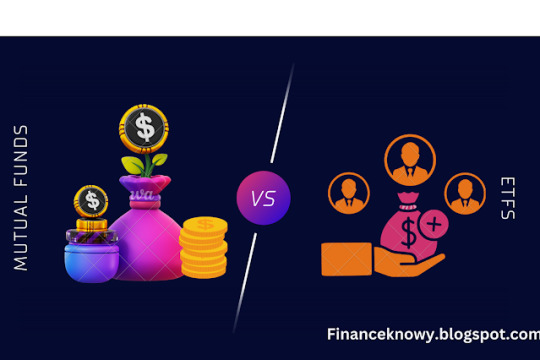
First off, we are going to start from the basics before battling with points to decide which is better. There are also other controversies not only between mutual funds and ETFs there is also another controversy between hedge funds vs mutual funds.
<<Related: The 5 Most Interesting Facts About What Hedged Funds Are
What is a mutual fund?
A mutual fund is an enterprise that brings together capital from many individuals and invests it in stocks, bonds, or other assets. The integrated holdings of stocks, bonds, or other assets the fund possesses are referred to as its portfolio.
What is an ETF?
An ETF is a type of security that you can purchase or trade via a brokerage company on a stock exchange. ETFs are presented in almost every imaginable asset category from conventional investments to so-called alternative investments like commodities or money.
Similarities between mutual funds and ETFs
They are a couple of similarities between mutual funds and ETFs.They are
both of these reserves are aimed at particular investors
It is likely to sponsor each of these funds for an affordable price
Both groups of funds supply investors with entry to portfolio expansion.
Apiece of these funds is professionally operated by proficient portfolio directors
It is negligibly risky to invest in each of these funds rather than to invest in separate bonds and stocks
Investors are supplied with a combination of investment routes under each of these funds
Difference between mutual funds and ETFs
The main difference between ETFs and Mutual Funds is that while ETFs can be industriously traded on the exchanges, just like any other funds, one can exclusively buy a unit of a Mutual Fund from a fund place even though these can be documented on the exchanges. In the same exact way, ETFs typically do not have any lowest lock-in duration and can be traded by an investor at their comfort.
Now that you have some basic insights into what mutual funds are and what ETFs are. Let's move on to the main point of this blog, which is some of the most intriguing facts about Mutual funds v ETFs.
And the first thing we are going to talk about is
Mutual fund v ETF tax efficiency
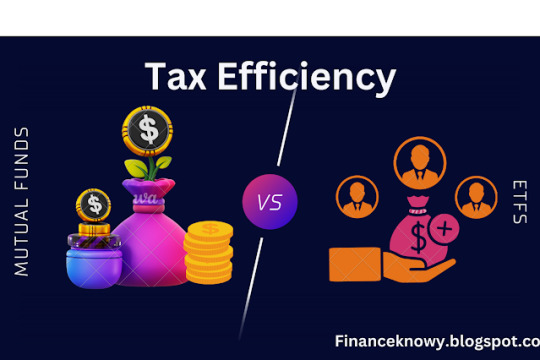
ETFs most often can be more tariff efficient likened to conventional mutual funds. Typically, owning an ETF in a taxable account will yield fewer tax liabilities than if you held a likewise structured mutual fund in the exact account. But there are also a couple of things that will determine this. they are:
Managed Fund Tax Considerations
Capital Gains vs. Ordinary Income
ETF Taxes
Mutual Fund Taxes
READ MORE
0 notes
Text
Exploring the Importance of Investment in Student Life and How it Can Shape Your Future

Introduction:
Investing is an important aspect of financial planning that can have a significant impact on your future. As a student, you may be focused on completing your education and securing a job, but it's also important to start thinking about your financial future. Investing early in life can help you grow your wealth over time and set yourself up for a more secure financial future. In this blog, we'll be exploring the importance of investment in student life and how it can shape your future. We'll look at different investment options available to students, discuss the benefits of starting to invest early, and provide tips and suggestions on how to get started. By the end of this blog, you'll have a better understanding of the importance of investing in your financial future and be equipped with the knowledge and tools to start investing today.
Learn the basics of investing and how it can help grow wealth over time:
Investing is the process of allocating resources, usually money, with the expectation of generating an income or profit. The basic idea behind investing is to put your money to work for you by purchasing assets that have the potential to increase in value over time. This can include stocks, bonds, real estate, and mutual funds. The goal of investing is to grow your wealth over time by earning a return on your investment. This return can come in the form of dividends, interest, or capital appreciation. By investing in a diversified portfolio of assets, you can spread risk and increase the chances of earning a positive return on your investment. It's important to remember that investing involves risk, and the value of investments can go up or down depending on market conditions.
Importance of starting to invest early in life:
Starting to invest early in life is important for several reasons. One of the main benefits is the power of compound interest, which allows your investments to grow at an increasing rate over time. The earlier you start investing, the more time your money has to grow and compound. Additionally, starting early allows you to take on more risk, as you have more time to ride out market fluctuations. Furthermore, starting early gives you more time to take advantage of the wealth management solution and develop a sound investment strategy that suits your financial goals. By starting to invest early, you can set yourself up for a more secure financial future and be on the path to achieving your financial goals.
How students can start investing, even on a tight budget:
Starting to invest as a student can be challenging, especially on a tight budget. However, there are several ways for students to start investing, even with a limited amount of money. One popular option is to start a sip vs mutual fund. A SIP allows you to invest a fixed amount of money on a regular basis, typically monthly, regardless of the market conditions. This allows you to accumulate units in the fund over time, rather than investing a lump sum all at once. Another option is to invest in exchange-traded funds (ETFs), which are a type of investment fund that tracks an index, a commodity, or a basket of assets like an index fund, but trades like shares on an exchange.
Conclusion:
In conclusion, investing is an important aspect of financial planning that can have a significant impact on your future. As a student, it's important to start thinking about your financial future and start investing early. By starting to invest early, you can take advantage of the power of compound interest, take on more risk, and have more time to develop a sound investment strategy. There are several options available for students to invest in, such as stocks, mutual funds, ETFs, and real estate. It's important to educate yourself on different investment options and seek professional advice before making any decisions.
Starting small and building your portfolio over time is the key to successful investing, even on a tight budget. By following the tips discussed in this blog and starting a systematic investment plan, students can start building a portfolio that can help them achieve their financial goals over time. Remember that, investing is not a short-term solution but a long-term commitment, and it's important to have patience and stick to your investment plan.
#equity oriented mutual funds#wealth creation plan#wealth management platform#digital wealth management platform#sip or mutual funds#solutions wealth management#mutualfund#sip#investment management
0 notes